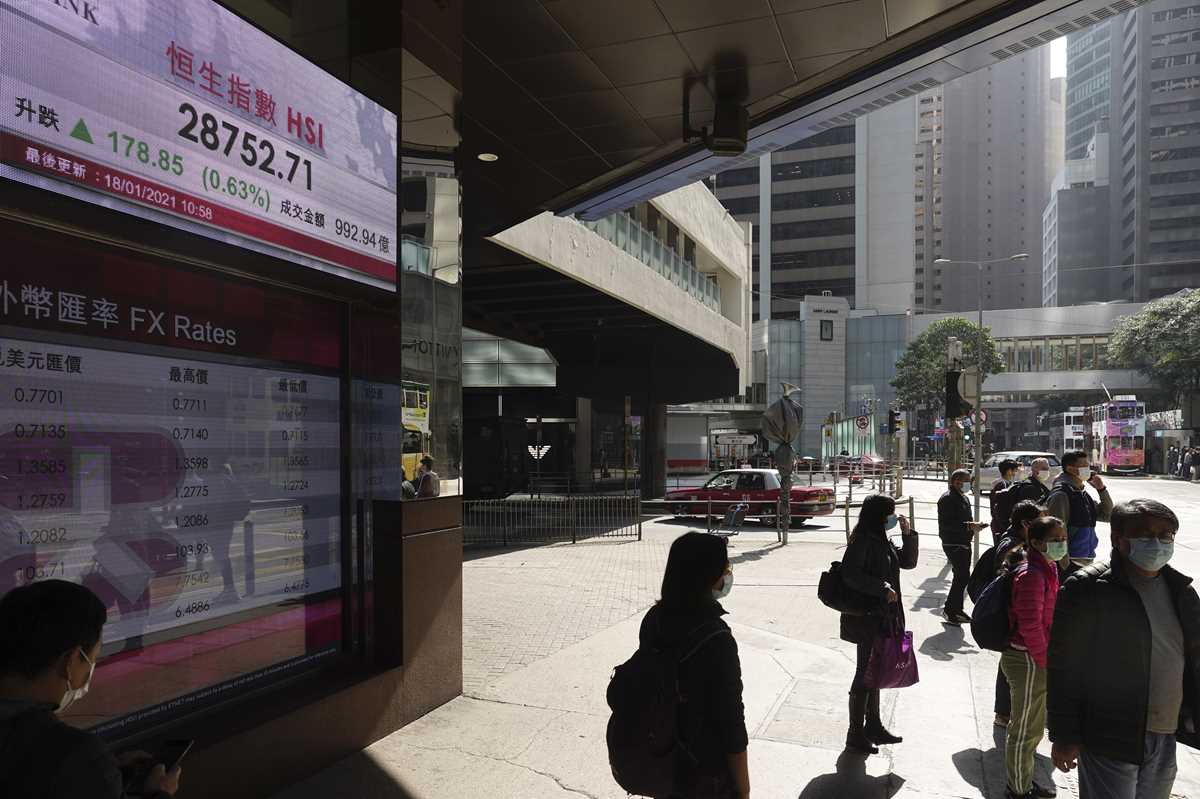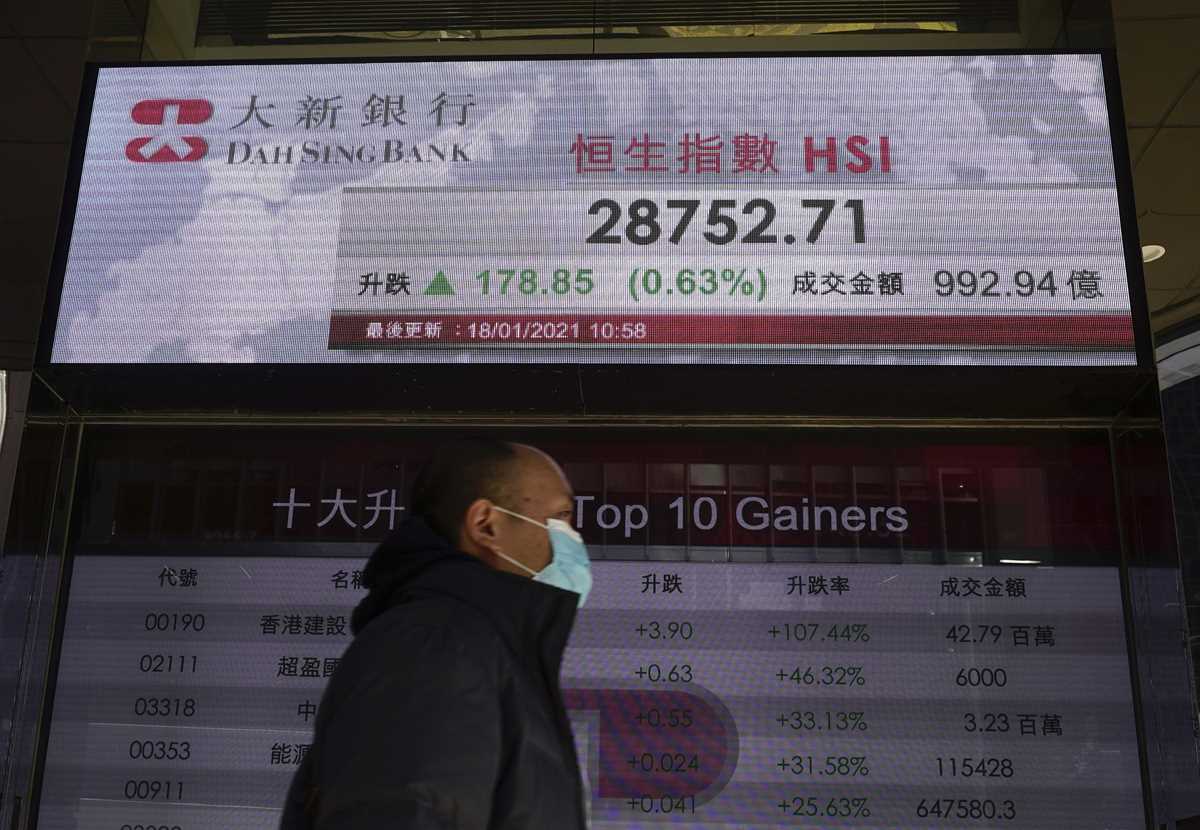 A woman walks past a bank's electronic board showing the Hong Kong share index at Hong Kong Stock Exchange Monday, Jan. 18, 2021. Shares fell Monday across most of Asia following a retreat on Wall Street, but benchmarks in Hong Kong and Shanghai rose after data showed the Chinese economy grew a solid 2.3% in 2020. (AP Photo/Vincent Yu)
A woman walks past a bank's electronic board showing the Hong Kong share index at Hong Kong Stock Exchange Monday, Jan. 18, 2021. Shares fell Monday across most of Asia following a retreat on Wall Street, but benchmarks in Hong Kong and Shanghai rose after data showed the Chinese economy grew a solid 2.3% in 2020. (AP Photo/Vincent Yu) People stand near a bank's electronic board showing the Hong Kong share index at Hong Kong Stock Exchange Monday, Jan. 18, 2021. Shares fell Monday across most of Asia following a retreat on Wall Street, but benchmarks in Hong Kong and Shanghai rose after data showed the Chinese economy grew a solid 2.3% in 2020. (AP Photo/Vincent Yu)
People stand near a bank's electronic board showing the Hong Kong share index at Hong Kong Stock Exchange Monday, Jan. 18, 2021. Shares fell Monday across most of Asia following a retreat on Wall Street, but benchmarks in Hong Kong and Shanghai rose after data showed the Chinese economy grew a solid 2.3% in 2020. (AP Photo/Vincent Yu) A man walks past a bank's electronic board showing the Hong Kong share index at Hong Kong Stock Exchange Monday, Jan. 18, 2021. Shares fell Monday across most of Asia following a retreat on Wall Street, but benchmarks in Hong Kong and Shanghai rose after data showed the Chinese economy grew a solid 2.3% in 2020. (AP Photo/Vincent Yu)
A man walks past a bank's electronic board showing the Hong Kong share index at Hong Kong Stock Exchange Monday, Jan. 18, 2021. Shares fell Monday across most of Asia following a retreat on Wall Street, but benchmarks in Hong Kong and Shanghai rose after data showed the Chinese economy grew a solid 2.3% in 2020. (AP Photo/Vincent Yu)Shares fell Monday across most of Asia following a retreat on Wall Street, but benchmarks in Hong Kong and Shanghai rose after data showed the Chinese economy grew a solid 2.3% in 2020.
The stronger than expected performance for the world's second-largest economy helped counter growing wariness among investors over deepening economic devastation from the pandemic around the globe.
China was the first country to suffer outbreaks of the new coronavirus and the first major economy to begin recovering as meanwhile the U.S., Europe and Japan are struggling with outbreaks.
The Hang Seng in Hong Kong gained 0.8% to 28,810.65 while the Shanghai Composite index climbed 0.8% to 3,596.22.
But gloom prevailed in other major regional markets. Tokyo's Nikkei 225 dropped 1% to 28,242.21 and the Kospi in South Korea lost 2.3% to 3,013.93. Australia’s S&P/ASX 200 declined 0.8% to 6,663.00. Shares fell in Southeast Asia and Taiwan.
U.S. futures also were lower. Markets are closed in the U.S. on Monday for Martin Luther King Jr. day.
China's National Bureau of Statistics said growth in the three months ending in December rose to 6.5% over a year earlier, up from the previous quarter’s 4.9%. The economy contracted at a 6.8% pace in the first quarter of 2020 as the country fought the pandemic with shutdowns and other restrictions.
Some measures showed a slowing of activity in December, but “The big picture is still that activity remains strong, which is helping to support the labor market," Stephen Innes of Axi said in a commentary.
On Friday, the S&P 500 fell 0.7% to 3,768.25, with stocks of companies that most need a healthier economy taking some of the sharpest losses. It lost 1.5% over the week.
The Dow Jones Industrial Average lost 0.6% to 30,814.26, and the Nasdaq composite dropped 0.9% to 12,998.50. The Russell 2000 index of small-cap stocks lost 1.5% to 2,123.20.
Treasury yields also dipped as reports showed shoppers held back on spending during the holidays and are feeling less confident, the latest in a litany of discouraging data on the economy.
Friday was the first chance for traders to act after President-elect Joe Biden unveiled details of a $1.9 trillion plan to prop up the economy. He called for $1,400 cash payments for most Americans, the extension of temporary benefits for laid-off workers and a push to get COVID-19 vaccines to more Americans.
That fit investors’ expectations for a big and bold plan, but markets had already rallied powerfully in anticipation of it.
Biden’s Democratic allies will have control of the House and Senate, but only by the slimmest of margins in the Senate. That could hinder the chances of the plan’s passage.
The urgency for providing such aid is ramping by the day. One report on Friday showed that sales at retailers sank by 0.7% in December, a crucial month for the industry. The reading was much worse than the 0.1% growth that economists were expecting, and it was the third straight month of weakness.
For many investors the big question is what ramped up government spending may mean for interest rates and inflation.
Treasury yields have been climbing on expectations the government will borrow much more to pay for its stimulus, in addition to improved economic growth and higher inflation. The yield on the 10-year Treasury zoomed above 1% last week for the first time since last spring and briefly topped 1.18% this week.
Higher interest rates could divert some investments away from shares and into bonds. The yield on the 10-year Treasury was steady at 1.09%.
In other trading, benchmark U.S crude oil lost 20 cents to $52.16 per barrel in electronic trading on the New York Mercantile Exchange. It gave up $1.21 on Friday to $52.36. Brent crude, the international standard, shed 28 cents to $54.82 per barrel.
The dollar was trading at 103.73 Japanese yen, down from 103.88 yen on Friday. The euro strengthened to $1.2084 from $1.2078.
___
AP Business Writer Joe McDonald in Beijing contributed.
Before you make your next trade, you'll want to hear this.
MarketBeat keeps track of Wall Street's top-rated and best performing research analysts and the stocks they recommend to their clients on a daily basis.
Our team has identified the five stocks that top analysts are quietly whispering to their clients to buy now before the broader market catches on... and none of the big name stocks were on the list.
They believe these five stocks are the five best companies for investors to buy now...
See The Five Stocks Here
As the AI market heats up, investors who have a vision for artificial intelligence have the potential to see real returns. Learn about the industry as a whole as well as seven companies that are getting work done with the power of AI.
Get This Free Report